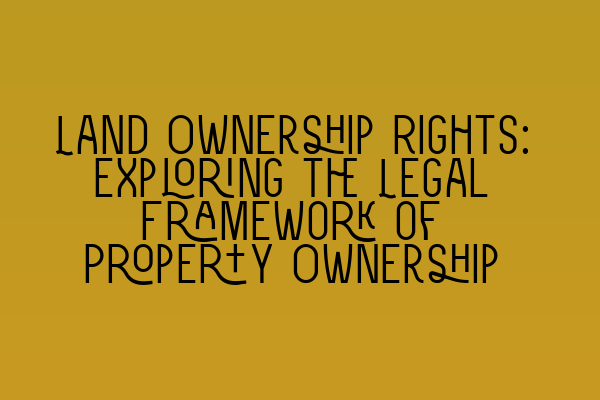Land Ownership Rights: Exploring the Legal Framework of Property Ownership
When it comes to land ownership rights, understanding the legal framework is essential. The laws governing property ownership provide individuals and entities with the right to possess, use, and transfer land. Whether you are a prospective buyer, a property developer, or a homeowner, having a clear understanding of land ownership rights is crucial in order to navigate the property market with confidence and protect your interests. In this article, we will explore the legal framework of property ownership, shedding light on the rights and responsibilities that come with owning land.
Types of Land Ownership
Before delving into the legal aspects, it is important to understand the different types of land ownership. In general, land can be owned freehold or leasehold. Freehold ownership grants the owner full ownership rights over the land, including the buildings and any other structures on it. Leasehold ownership, on the other hand, provides the owner with a long-term lease on the land, typically for a specific number of years.
When it comes to leasehold ownership, it is crucial to understand the terms and conditions of the lease. This includes any restrictions or obligations imposed by the lease agreement, such as maintenance responsibilities or the requirement to seek permission for certain alterations. It is important to carefully review the leasehold agreement and seek legal advice if necessary to ensure that you fully understand your rights and responsibilities as a leaseholder.
The Basics of Property Ownership
Property ownership is based on the concept of title. Title refers to the legal evidence of ownership, which is typically recorded in a land register. It is essential for property owners to have clear and undisputed title to their land in order to protect their rights. A solicitor or conveyancer can assist in conducting a title search and ensuring that the property is free from any encumbrances or other legal issues that could affect ownership.
It is also important to understand the concept of boundaries in property ownership. Boundaries define the extent of an individual’s property and can sometimes be a source of disputes. Clearly defined boundaries, such as fences or walls, can provide evidence of the extent of one’s property. However, disputes can still arise, and in such cases, it may be necessary to seek legal assistance to resolve the issue.
When acquiring property, it is essential to have a thorough understanding of the legal requirements and processes involved. This includes conducting searches, negotiating contracts, and ensuring that all necessary legal documents are properly prepared and executed. A solicitor or conveyancer with expertise in property law can guide you through the process and ensure that your rights are protected.
Restrictions and Regulations on Land Use
Property ownership comes with certain restrictions and regulations on land use. These restrictions can be imposed by governmental bodies, local authorities, or even by private agreements. Some common types of restrictions include planning restrictions, environmental regulations, and restrictive covenants.
Planning restrictions are put in place to regulate the use of land and to ensure that development is carried out in a responsible and sustainable manner. These restrictions can include limitations on the type of buildings that can be constructed, the height of buildings, and the use of land for specific purposes. It is important to be aware of any planning restrictions that may apply to your property, as non-compliance can lead to penalties and legal consequences.
Environmental regulations also play a significant role in land use. These regulations aim to protect the environment and ensure that development activities do not harm ecosystems or natural resources. It is important to understand the environmental regulations that are applicable to your land and to take necessary precautions to comply with them.
Restrictive covenants are private agreements that restrict the use of land for a specific purpose or impose certain obligations on the owner. These covenants can be found in the title deeds and can affect the use and development of the land. It is important to carefully review the title deeds and seek legal advice if you encounter any restrictive covenants.
Protecting Your Land Ownership Rights
Protecting your land ownership rights involves taking proactive steps to ensure that your interests are safeguarded. This includes conducting thorough due diligence before acquiring a property, seeking legal advice when necessary, and complying with all legal requirements and regulations.
In addition, having a clear understanding of your rights and responsibilities as a property owner is crucial. This includes knowing your property boundaries, understanding any restrictions or obligations that may apply, and seeking legal assistance when disputes arise.
Conclusion
Land ownership rights form the foundation of property ownership. Understanding the legal framework of property ownership is essential in order to navigate the property market effectively and protect your interests. By familiarizing yourself with the different types of ownership, the basics of property ownership, the restrictions and regulations on land use, and the importance of protecting your rights, you can confidently participate in the property market and ensure that your ownership rights are upheld.
For more information on related legal topics, please read our articles:
- Ethics in Contract Law: Navigating the Moral and Legal Dimensions
- Misrepresentation in Contracts: Unveiling Deceptive Practices
- A Closer Look at SQE Contract Law Syllabus
- SQE Contract Law: Analyzing Landmark Cases and Influential Judicial Decisions
- Contract Law for Services: Key Considerations and Best Practices
